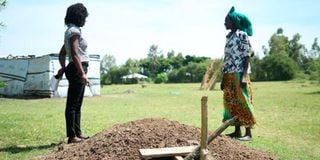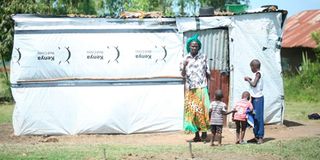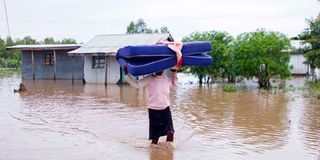Premium
Floods push Nyando residents bury the dead on ‘foreign’ land

Prisca Atieno Obunga (right) near her daughter's grave at a church compound in Kanyagwal village.
Ms Prisca Atieno stares blankly at her daughter's fresh grave at Kanyagwal, Ombaka sub-location in Kisumu County.
The grave lies approximately 300 metres from Lake Victoria. Near the grave is a Legio Maria church which has been her new home for the last two years after being displaced by the lake's rising water levels.
Two months ago, Ms Atieno was forced to bury her 18-year-old daughter, Trizer Achieng’, in the church compound.
She joined hundreds of Ogenya and Ombaka sub-locations residents who have been forced to find alternative burial sites around churches or in their relatives and friends' homes.
Ms Atieno left her home in Ogenya two years ago after Lake Victoria water levels rose, pushing her family out of their home.

Children row a boat in Kakola Ombaka, Kisumu County on May 12, 2021.
“I could not take my daughter's body home for burial because our homestead was submerged in water,” she said.
Achieng’ who was a Form Three student at Kanyagwal Secondary School complained of joint pains before she was rushed to Ahero Sub-County Hospital.
Health workers prescribed drugs worth Sh6,000. Her mother could not raise the money. Her condition deteriorated. She died a few days later.
“After her death, the thought of giving her a befitting burial became a major headache, we did not have a place to bury her,” says Ms Atieno.

Prisca Atieno Obunga and her grandchildren at her home in Kanyagwal village, Kisumu County.
She had moved to the church compound while her son-in-law moved to Kanyagwal rescue camp.
“Luo customs prohibited me from living in the same compound with my son-in-law, so I had to leave,” she said.
“The church gave me a place to bury my daughter. I was also allowed to live here and mourn the death of my daughter for the next four months,” she said.
Before the lake water levels began to rise, she was a peasant farmer who hawked her farm produce at Ahero town. But this is no longer possible, thanks to the effects of climate change. She has since turned to weaving mats using papyrus reeds.
“I don’t have money to buy a new piece of land, I now rely on well-wishers and my little business for upkeep,” she says.
A few kilometers from Ms Atieno’s compound stands a newly constructed hut.

A woman carries a mattress at their flooded village in Kakola Ombaka in Nyando, Kisumu County on May 12, 2021.
Mr William Ndong'a, 68, built the hut three months ago following the death of his 88-year-old mother who had also been displaced. She had moved to Mr Ndong'a's home where she died in October last year.
“According to the Luo customs, my mother should have been laid to rest in her compound, however, that was not possible,” Mr Ndong’a says.
"I had to bury my mother in my compound and not near my father's grave as she had wished," he told Nation.Africa.
The locals say that living in the camps has denied their loved ones befitting send offs.
He said that in some cases, they have to part with at least Sh5,000 to lease burial sites. He says that funeral expenses for family heads are often higher.
“When a family head dies, family members must lease a piece of land and erect temporary structures where they are expected to stay before the burial,” he says.
He says most land owners always allow the family of the deceased to stay in the 'leased ' land for six months before they can leave.

Displaced flood victims wait for relief food at Kakola Ombaka village in Kisumu County on July 14, 2021.
In 2019, a number of residents were displaced. Their hope of going back to their homes keeps fading.
“Some of our compounds have turned into fishing zones, the water levels keep rising,” says Mr Ndong’a.
Ombaka Assistant chief Jacob Ong’udi says that only a few families have returned to their homes. At least 60 households are still living in tents as they wait for the water levels to subside.
Mr Odungi Randa, a member of the Luo Council of elders said that the community’s traditions require the deceased to be buried in their homes.
“According to the Luo culture, a man should be buried on the right hand side of his compound while the wife should be laid to rest on the left,” says Mr Randa.
In cases of calamities, he says, tradition can be ignored.
“In such cases, the deceased's family members are required to erect a temporary structure where the body of their departed kin is required to spend the night before burial,” says Mr Odungi.
According to Mr Odungi, while the customs allow burial on leased land, the exercise often sparks land disputes. He says flood victims should be taught how to manage the ever rising Lake Victoria water levels.





